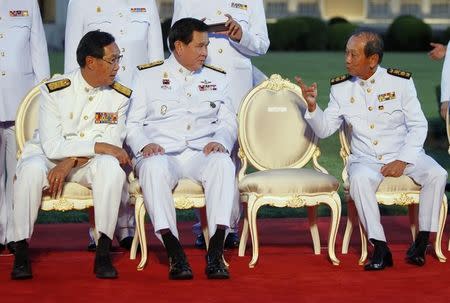Thailand's junta considers subsidy for poor farmers

BANGKOK (Reuters) - Thailand's finance ministry plans to propose next month a subsidy to help ease the burden on farmers at a time of falling commodity prices as the military government seeks to revitalise an economy depressed by months of political unrest. The army seized power in May in a bid to restore order and kick-start Southeast Asia's second-largest economy, which contracted in the first half due to the turmoil. The scheme is not considered a populist measure "because it will not be for everyone, but low-income earners," Finance Minister Sommai Phasee told reporters on Thursday. "I've talked to the deputy prime minister that the government must help poor farmers with a subsidy to help ease their burden," he said, referring to Pridiyathorn Devakula, who is in charge of economic matters. Sommai said the ministry was working out details and the benefits would be based on the level of farmers' income and the size of the areas they farm. The funding could come from the Bank of Agriculture and Agricultural Cooperatives and the annual budget. Sommai said he also agreed with another plan to pay benefits to low-income earners and aimed to push it ahead in the next fiscal year starting Oct. 1. The plan is to make supplementary payments of as much as 20 percent of their income to those who earn less than 80,000 baht ($2,500) a year, the ministry said previously. Sommai said both programmes would cost at least 100 billion baht ($3 billion) a fiscal year, but saw no problem with the funding. Junta leader General Prayuth Chan-ocha has said the junta will avoid populist policies or costly projects that might burden a future administration. Protests against the government of former Prime Minister Yingluck Shinawatra focused on populist policies her critics said were used to buy votes. Still, the military administered what was effectively a swift cash injection into the rural economy shortly after taking power by paying billions of dollars in arrears owed to rice farmers through a failed subsidy scheme that was one of Yingluck's flagship policies. The military government has also extended tax breaks and subsidies for some fuel and public transport. ($1=32.3 baht) (Reporting by Kitiphong Thaichareon; Writing by Orathai Sriring; Editing by Clarence Fernandez)

